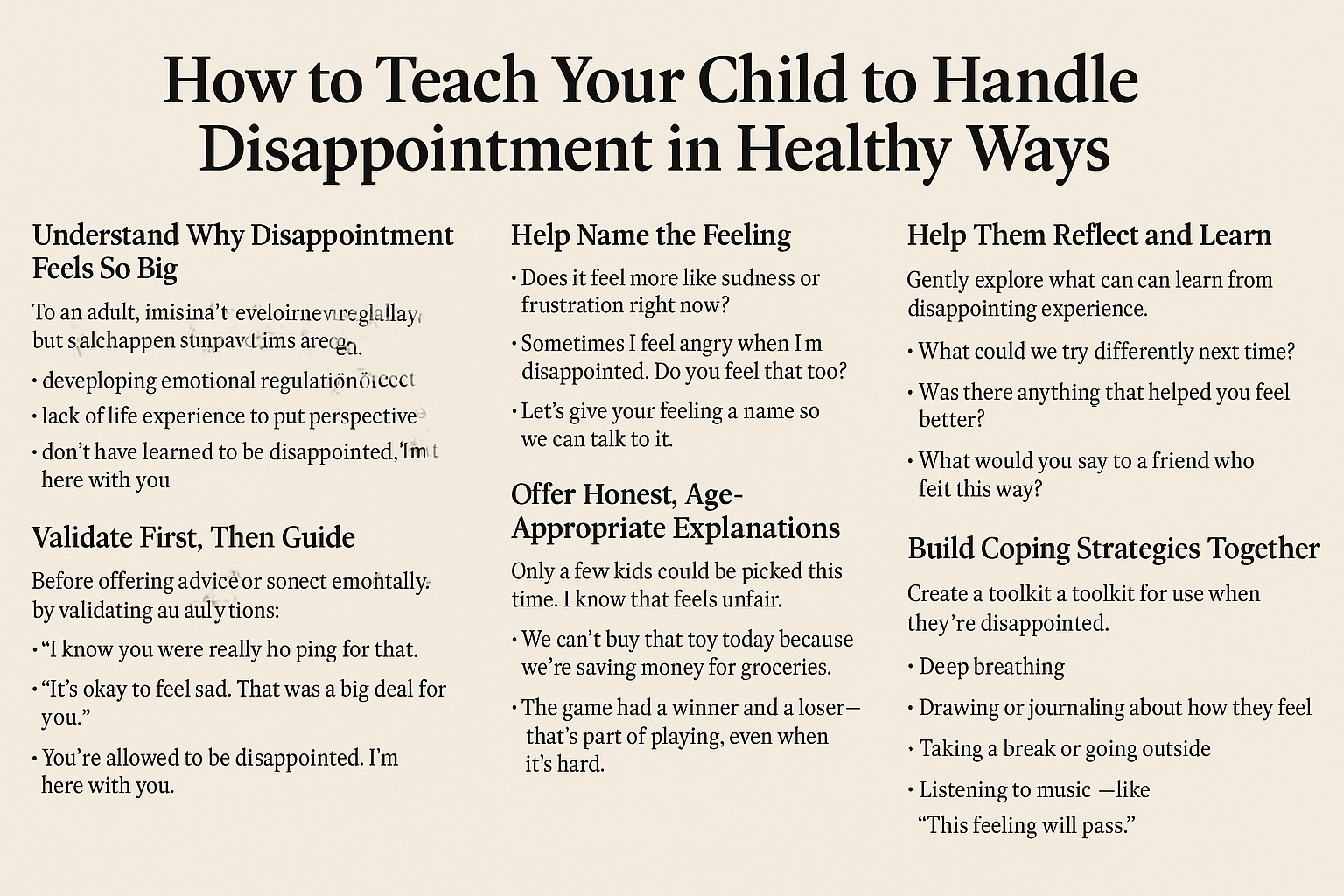Disappointment is part of life. Whether it’s losing a game, not getting the toy they wanted, or hearing “no” to something they were excited about—children will face many letdowns as they grow.
But disappointment doesn’t have to lead to meltdowns or lasting sadness. With your help, your child can learn how to handle it with resilience, emotional intelligence, and perspective.
Here’s how to guide your child through life’s inevitable disappointments in a healthy, supportive way.
Understand Why Disappointment Feels So Big
To an adult, missing out on dessert or not being invited to a party might seem small. But to a child, these moments can feel huge—because:
- Their brains are still developing emotional regulation
- They don’t have life experience to put things into perspective
- They may tie their identity to outcomes (“I didn’t win, so I’m not good enough”)
- They haven’t learned to separate wants from needs
Acknowledging that your child’s feelings are real—even if the situation seems minor—shows respect and builds trust.
Validate First, Then Guide
Before offering advice or solutions, connect emotionally. Validating your child’s disappointment helps them feel seen, which is the first step in calming down.
Try saying:
- “I know you were really hoping for that.”
- “It’s okay to feel sad. That was a big deal for you.”
- “You’re allowed to be disappointed. I’m here with you.”
Once your child feels understood, they’ll be more open to comfort and problem-solving.
Stay Calm and Supportive
It’s hard to see your child upset—but reacting with frustration or trying to “cheer them up” too quickly can send the message that emotions are wrong or inconvenient.
Instead:
- Sit quietly beside them
- Offer a hug or gentle physical support
- Use a calm, steady voice
- Give them time to process
Sometimes your presence is all they need to begin healing.
Help Name the Feeling
Disappointment can come with a mix of emotions: sadness, anger, embarrassment, frustration.
Help your child identify what they’re feeling:
- “Does it feel more like sadness or frustration right now?”
- “Sometimes I feel angry when I’m disappointed. Do you feel that too?”
- “Let’s give your feeling a name so we can talk to it.”
Emotional awareness is the first step in emotional regulation.
Offer Honest, Age-Appropriate Explanations
Help your child understand the situation in clear, gentle terms.
Examples:
- “Only a few kids could be picked this time. I know that feels unfair.”
- “We can’t buy that toy today because we’re saving money for groceries.”
- “The game had a winner and a loser—that’s part of playing, even when it’s hard.”
Keep your explanations simple and honest, without overexplaining or minimizing.
Avoid Toxic Positivity
Phrases like “It’s not a big deal” or “Just be happy” can make your child feel like their emotions are wrong.
Instead, balance realism with optimism:
- “It’s okay to feel disappointed and know that you’ll feel better soon.”
- “This is hard right now, but I know you can handle it.”
- “You’re learning how to deal with big feelings—and that’s a good thing.”
Acknowledging pain while offering hope teaches emotional resilience.
Help Them Reflect and Learn
Once your child is calm, gently explore what they can learn from the experience.
Ask:
- “What could we try differently next time?”
- “Was there anything that helped you feel better?”
- “What would you say to a friend who felt this way?”
Reflection builds self-awareness, problem-solving skills, and confidence.
Build Coping Strategies Together
Help your child create a toolkit of things they can do when they’re feeling disappointed:
- Deep breathing
- Drawing or journaling about how they feel
- Taking a break or going outside
- Talking to a trusted adult
- Listening to music
- Saying positive affirmations like “This feeling will pass”
Practice these tools before disappointment hits, so they’re easier to use when needed.
Normalize Setbacks and Rejection
Talk openly about your own disappointments and how you handled them.
Say:
- “I didn’t get a job I wanted once. I felt really down, but then I kept trying.”
- “I remember losing a race when I was your age. I was sad, but it made me want to practice more.”
Sharing your experience teaches that disappointment is not the end of the story—it’s part of the journey.
Celebrate Effort, Not Just Outcomes
Reinforce that what matters most is trying, growing, and showing up.
Praise things like:
- “I saw how much effort you put into that.”
- “You were really brave to try, even though you were nervous.”
- “I’m proud of you for caring so much—that means you gave it your all.”
This mindset helps your child feel proud even when things don’t go as planned.
Disappointment Builds Strength—With Support
Disappointment is never easy, especially for a young heart. But when you guide your child through it with patience, empathy, and encouragement, you’re teaching them something powerful:
They can feel sad and survive it.
They can lose and still be worthy.
They can face setbacks—and keep moving forward.
That’s the foundation of emotional resilience—and a skill that will serve them for the rest of their life.
